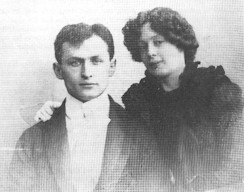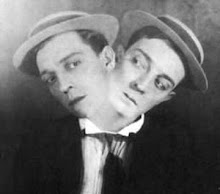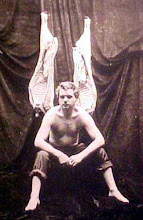Bloggers and academics alike suggest that the lighter fare of the Globetrotter exhibition is weighted with minstrelsy's complex legacy. Uncle Toms in their Uncle Sam starsandbars uniform.
Wilt Chamberlain played for the Globetrotters. So did baseball Hall of Famer Bob Gibson.
The Globetrotters played for Pope Pius XII in 1951.
They have starred in two feature films, a Saturday morning cartoon, a variety show, and have guested on Gilligan's Island and Scooby Doo.
Honary members of the Globetrotters include: Henry Kissinger, Bob Hope, Nelson Mandela, Pope John Paul, and Jesse Jackson.
From 1962 until the approximate present, the Globetrotters have a win-loss record of 12,594-5.
The term for losing-on-purpose or staging the outcome of a contest is "kayfabe," which apparently is carny slang of undetermined derivation. Professional Wrestling is the most prominent example of kayfabe. The team that is paid to lose to the Globetrotters is the Washington Generals.
 Louis "Red" Klotz is the founder of the Washington Generals. Klotz is the third shortest player ever to play in the NBA (5'7). He averaged 1.4 PPG for the Baltimore Bullets. After his stint in the NBA, Klotz starred with the ABL's Philadelphia SPHAs (an acronym for South Philadelphia Hebrew Association). In addition to running the Generals, Klotz was the team's pointguard until he was 62 years old and in 1971, at age 50, he hit a jumper at the buzzer to beat the Globetrotters in overtime. Klotz claims the Generals try to win every game.
Louis "Red" Klotz is the founder of the Washington Generals. Klotz is the third shortest player ever to play in the NBA (5'7). He averaged 1.4 PPG for the Baltimore Bullets. After his stint in the NBA, Klotz starred with the ABL's Philadelphia SPHAs (an acronym for South Philadelphia Hebrew Association). In addition to running the Generals, Klotz was the team's pointguard until he was 62 years old and in 1971, at age 50, he hit a jumper at the buzzer to beat the Globetrotters in overtime. Klotz claims the Generals try to win every game.Apparently, in the 30s and 40s, Jews were charged with the same backdoor praise as African-Americans - that they were intrinsically better ballers than their double-dribbling Gentile neighbors. The writer Paul Gallico said Jews excelled at basketball because "the game places a premium on an alert, scheming mind, flashy trickiness, artful dodging and general smart aleckness." Newly emigrated Jews poured off boats and into the ghettos of eastern cities. Then, as now, basketball was an inner-city game. This certainly sounds familiar: "It was absolutely a way out of the ghetto," said Dave Dabrow, a guard with the original Philadelphia Hebrews. "It was where the young Jewish boy would never have been able to go to college if it wasn't for the amount of basketball playing and for the scholarship." (jewishmag.com)
In the halcyon days of barnstorming basketball, there were all-Jewish teams in addition to all-African-American teams. There was a team called the Cleveland Rosenblums.
 The Philadelphia SPHAs often matched up with the all-black New York Renaissance. And from the inside, the view was no less skewed. A former SPHA claims the Jewish teams played "a quick-passing running game, as opposed to the bullying and fighting way which was popular other places," while a former member of the NY Rens tells us the SPHAs were a "thinking" team while the Rens relied on "quickness."
The Philadelphia SPHAs often matched up with the all-black New York Renaissance. And from the inside, the view was no less skewed. A former SPHA claims the Jewish teams played "a quick-passing running game, as opposed to the bullying and fighting way which was popular other places," while a former member of the NY Rens tells us the SPHAs were a "thinking" team while the Rens relied on "quickness." This is the ghost of a research paper without the thesis. Certainly vaudeville, sports, and race are all knotted up here. Just gander again at that Washington Generals logo. Initially, I wanted to write on the phenomena of the Generals as a metaphor for somethingimnotsurewhat. Losing perpetually, purposefully, artfully, heroically. A team of straight men. Straw men. Patsies. Dumbstruck, breezed by, dunked on. For a living. And once I found out that the Generals' genesis, Red Klotz seemed an aptly named figurehead for my hasty constellation of ideas. But digging deeper, the history took over and it's too big for me here. The history of American popular culture never fails to be denser and more convoluted than you'd imagine. The. Ball. Is. In. Your. Court.







































3 comments:
I thought the Washington Generals were a metaphor for me losing my hair.
Your blog keeps getting better and better! Your older articles are not as good as newer ones you have a lot more creativity and originality now. Keep it up!
And according to this article, I totally agree with your opinion, but only this time! :)
I am reading this article second time today, you have to be more careful with content leakers. If I will fount it again I will send you a link
Post a Comment